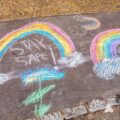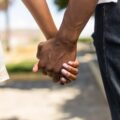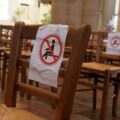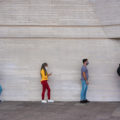Freedom and moral duty in times of COVID-19
Freedom and moral duty in times of COVID-19
The special position of religion in times of COVID-19 exposed a tension between two important values: religious freedom and moral duty towards others.
This article is part of our series on the social impact of COVID-19.
Religious freedom in times of COVID-19
Since the beginning of the pandemic over two years ago, religious communities in the Netherlands have been granted a special status regarding the measures against COVID-19. Christianity being the most common religion in the Netherlands, the unique position of Christian churches especially has been a recurring theme in the Dutch news.[1] Whereas the government decided what restrictions applied to theatres, universities, and the like, churches received different advice from the CIO. The CIO, an umbrella organisation of churches in the Netherlands, was able to interpret the measures independently from the government.[2] The prohibition of gathering that applied to virtually all other aspects of society did not apply to churches and other religious communities. Still, churches were expected to keep physical services limited and to adhere to certain safety rules.[3]
This special treatment of churches is based on their religious character. Over the past two years, religious communities were exempted from the general government restrictions on account of the constitutional right to religious freedom. This right is grounded in the separation of Church and State. According to this principle, the State is not to meddle in religious affairs.[4] For this reason, churches and other religious communities were granted special liberties with respect to COVID-19 restrictions.
The impact of COVID-19
Despite the special freedoms that churches enjoyed, most religious communities in the Netherlands saw a significant decline in attendance. For example, the Dutch organisation ‘Action Church Balance’ found that only 29% of church members had attended a physical service in the past year, even though most Christians missed the physical gatherings they attended before the pandemic. This finding was remarkably consistent for all denominations, including Catholics, Protestants, and Evangelicals.[5] A study by I&O Research also found that Catholics felt less connected to ecclesiastical institutions than to other organisations, such as sports clubs or political parties. Roughly 25% of Dutch Catholics said they expected to attend church services much less or not at all once the COVID-19 measures were relaxed.[6] The Reformed Church has likewise raised their concerns about the psychological damage created by the COVID-19 measures. Church members were losing their sense of engagement, even though this engagement was strongly missed.[7]
This increase in fear and loneliness was seen worldwide. The incidence of anxiety disorders and depression has more than doubled in most countries around the world during the pandemic, says Prof. John Ioannidis, the most cited epidemiologist in the world. He adds that most of this effect was produced by the restrictive measures, such as lockdowns, which strongly increased social isolation, educational deficits, and financial insecurity.[8]
Freedom vs moral duty
The fact that so few believers attended physical gatherings at their churches can partly be explained by a fear of infection, but there are also moral considerations at play. The special position of churches during the pandemic brought with it a conflict of values. Some communities interpreted the restrictions as an assault on their religious freedom, while others saw them as a moral duty, and therefore as an expression of their religious values.[9] [10]
Based on the value of religious freedom, religious communities were granted special liberties in relation to the restrictive measures.[11] This partly has to do with people’s sense of what religion is for. Heiner Bielefeldt – professor in human rights and former UN special rapporteur for religious freedom – argues that the freedom to practice one’s religion, including its communal ceremonies, is most important when there is a crisis. After all, the freedom of religion was designed in difficult times, and was meant to be upheld during crises. To restrict religious freedom in an emergency should therefore always remain an exception, rather than a rule, Bielefeldt says.[12]
On the flip side of religious freedom, we find an appeal to moral duty and responsibility. The exceptional liberties of churches and other religious communities came with a moral duty: to handle these liberties responsibly.[13] In fact, many regarded the restrictive measures and mandates, such as vaccination and mask-wearing, as a religious duty to one’s neighbour. Pope Francis famously said that taking a COVID-19 vaccine was a “moral obligation” and an “act of love.”[14] He also said that anti-mask protesters were “incapable of moving outside of their own little world of interests,” thereby implying that not wearing a mask is selfish.[15] Some Dutch communities have adopted a similar view.[16]
Hence, the special position of religion in times of COVID-19 exposed a tension between two important values: religious freedom and moral duty towards others. Because religious communities were granted special freedoms, they were especially aware of their own responsibility in this crisis.
Want to learn more about similar topics? Go to the EARS Dashboard and receive weekly updates.
Sources
[2] Kerken moeten volgens commissaris van de Koning Jaap Smit hun verantwoordelijkheid nemen. ‘Je kunt niet zeggen: wij gaan onze goddelijke gang’ | Trouw
[3] Nederlandse kerken: ‘Vrees dat gelovigen afhaken door pandemie’ | Coronavirus | gelderlander.nl
[4] Kerken moeten volgens commissaris van de Koning Jaap Smit hun verantwoordelijkheid nemen. ‘Je kunt niet zeggen: wij gaan onze goddelijke gang’ | Trouw
[5] Nederlandse kerken: ‘Vrees dat gelovigen afhaken door pandemie’
[6] De pandemie heeft de binding tussen kerk en katholiek weinig goed gedaan
[8] Prof. John P.A. Ioannidis talk on “COVID-19 epidemiology: risks, measures, and ending the pandemic”.
[9] Christenen Collectief stuurt brief naar kerken: Neem afstand van coronabeleid.
[10] ‘Daad van naastenliefde’: bisschoppen wereldwijd pleiten voor vaccinatie tegen Covid – Katholiek Nieuwsblad.
[11] Directeur De Balie wil debatcentrum als kerk registreren om open te mogen | NU – Het laatste nieuws het eerst op NU.nl
[12] Mag burgemeester kerk sluiten? „Vrijheid van godsdienst is juist voor tijd van crisis”.
[13] Kerken moeten volgens commissaris van de Koning Jaap Smit hun verantwoordelijkheid nemen. ‘Je kunt niet zeggen: wij gaan onze goddelijke gang’ | Trouw
[14] On COVID vaccinations, Pope says health care is a ‘moral obligation’
[15] Fact check: Pope Francis criticizes those who refuse to wear masks
[16] ‘Daad van naastenliefde’: bisschoppen wereldwijd pleiten voor vaccinatie tegen Covid – Katholiek Nieuwsblad.






